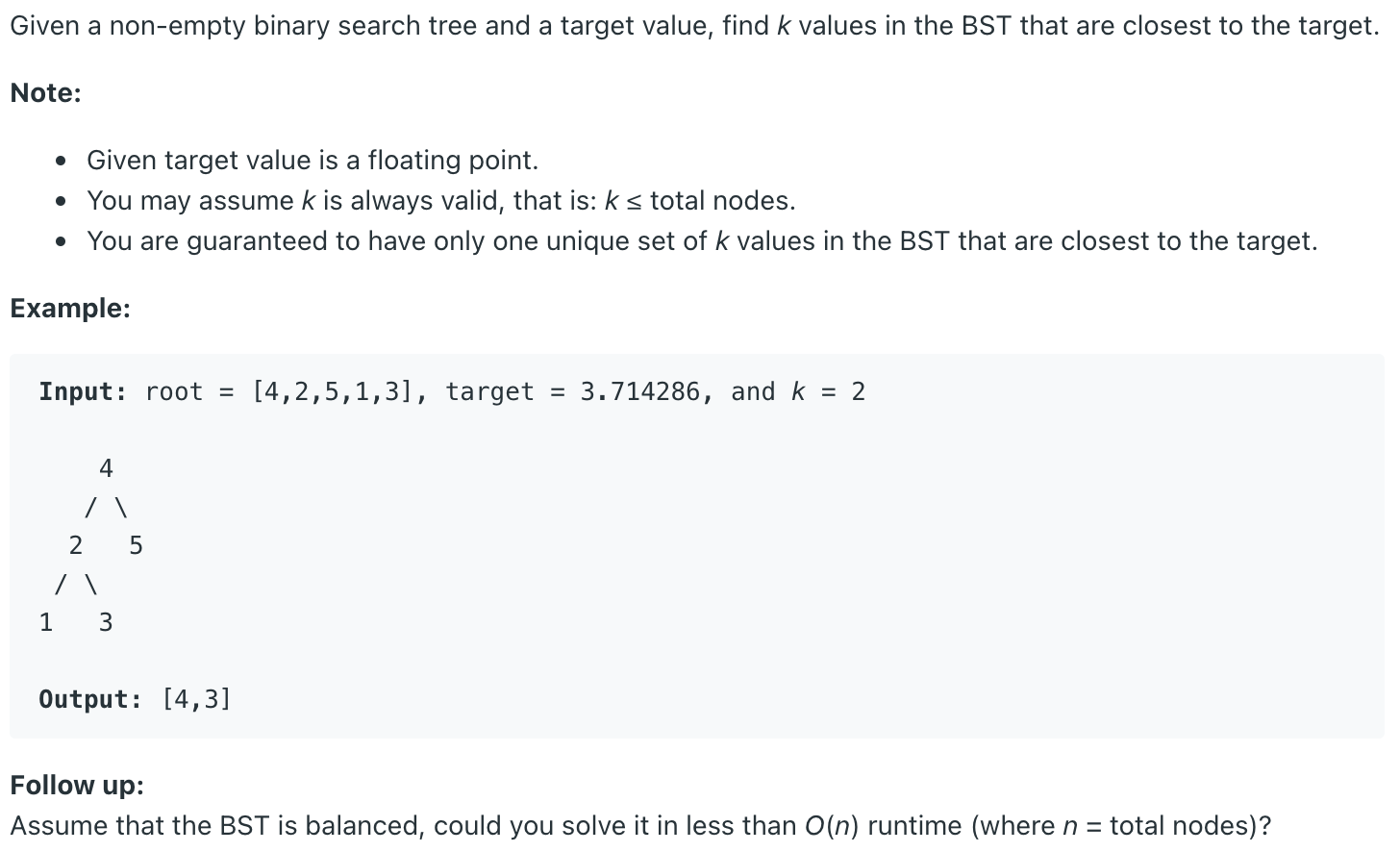Closest Binary Search Tree Value II
franklinqin0 TreeStackQuick Select

# Definition for a Binary Tree Node
class TreeNode:
def __init__(self, val=0, left=None, right=None):
self.val = val
self.left = left
self.right = right
1
2
3
4
5
2
3
4
5
# Solution
Let be the height and be the number of nodes of tree.
# Sort
Complexity
time: ( to build inorder traversal and to sort it)
space: (store nums)
def closestKValues(self, root: TreeNode, target: float, k: int) -> List[int]:
def inorder(root: TreeNode):
return inorder(root.left) + [root.val] + inorder(root.right) if root else []
nums = inorder(root)
nums.sort(key=lambda x: abs(x-target))
return nums[:k]
1
2
3
4
5
6
7
2
3
4
5
6
7
# Heap
Complexity
time: (push elts into the heap of size )
space: (heap of elements and recursion stack of tree height )
from heapq import heappush, heappop
def closestKValues(self, root: TreeNode, target: float, k: int) -> List[int]:
def inorder(root: TreeNode):
if not root: return
inorder(root.left)
heappush(heap, (-abs(root.val-target), root.val))
# keep the size of heap always to k
if len(heap) > k:
heappop(heap)
inorder(root.right)
heap = []
inorder(root)
return [v for _, v in heap]
1
2
3
4
5
6
7
8
9
10
11
12
13
14
2
3
4
5
6
7
8
9
10
11
12
13
14
# Inorder Predecessor & Successor
Time complexity of getPredecessor and getSuccessor is amortized O(1) because it's just part of the inorder traversal. If it's O(logn), the your inorder traversal is O(nlogn).
Complexity
time: (worst case: , getPredecessor and getSuccessor take amortized but worst time is )
space:
def closestKValues(self, root: TreeNode, target: float, k: int) -> List[int]:
res = []
preStack = []
sucStack = []
while root:
if root.val < target:
preStack.append(root)
root = root.right
else:
sucStack.append(root)
root = root.left
def getPredecessor(stack):
if stack:
pre = stack.pop()
p = pre.left
while p:
stack.append(p)
p = p.right
return pre
def getSuccessor(stack):
if stack:
suc = stack.pop()
p = suc.right
while p:
stack.append(p)
p = p.left
return suc
pre = getPredecessor(preStack)
suc = getSuccessor(sucStack)
while k:
k -= 1
if pre and not suc:
res.append(pre.val)
pre = getPredecessor(preStack)
elif not pre and suc:
res.append(suc.val)
suc = getSuccessor(sucStack)
elif pre and suc and abs(pre.val - target) <= abs(suc.val - target):
res.append(pre.val)
pre = getPredecessor(preStack)
elif pre and suc and abs(pre.val - target) >= abs(suc.val - target):
res.append(suc.val)
suc = getSuccessor(sucStack)
return res
1
2
3
4
5
6
7
8
9
10
11
12
13
14
15
16
17
18
19
20
21
22
23
24
25
26
27
28
29
30
31
32
33
34
35
36
37
38
39
40
41
42
43
44
45
46
47
48
49
2
3
4
5
6
7
8
9
10
11
12
13
14
15
16
17
18
19
20
21
22
23
24
25
26
27
28
29
30
31
32
33
34
35
36
37
38
39
40
41
42
43
44
45
46
47
48
49
# Quick Select
The following partition uses Lomuto's scheme.
Complexity
time: (worst case: )
space:
from random import randint
def closestKValues(self, root: TreeNode, target: float, k: int) -> List[int]:
def inorder(r: TreeNode):
return inorder(r.left) + [r.val] + inorder(r.right) if r else []
def partition(pivot_idx, left, right):
pivot_dist = dist(pivot_idx)
# 1. move pivot to end
nums[right], nums[pivot_idx] = nums[pivot_idx], nums[right]
store_idx = left
# 2. move more close elements to the left
for i in range(left, right):
if dist(i) < pivot_dist:
nums[i], nums[store_idx] = nums[store_idx], nums[i]
store_idx += 1
# 3. move pivot to its final place
nums[right], nums[store_idx] = nums[store_idx], nums[right]
return store_idx
def quickselect(left, right):
"""
Sort a list within left..right till kth less close element takes its place.
"""
# base case: the list contains only one element
if left == right:
return
# select a random pivot_index
pivot_idx = randint(left, right)
# find the pivot position in a sorted list
true_idx = partition(pivot_idx, left, right)
# if the pivot is in its final sorted position
if true_idx == k:
return
if true_idx < k:
# go left
quickselect(true_idx, right)
else:
# go right
quickselect(left, true_idx)
nums = inorder(root)
dist = lambda idx : abs(nums[idx] - target)
quickselect(0, len(nums) - 1)
return nums[:k]
1
2
3
4
5
6
7
8
9
10
11
12
13
14
15
16
17
18
19
20
21
22
23
24
25
26
27
28
29
30
31
32
33
34
35
36
37
38
39
40
41
42
43
44
45
46
47
48
49
50
51
52
2
3
4
5
6
7
8
9
10
11
12
13
14
15
16
17
18
19
20
21
22
23
24
25
26
27
28
29
30
31
32
33
34
35
36
37
38
39
40
41
42
43
44
45
46
47
48
49
50
51
52